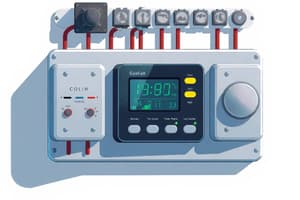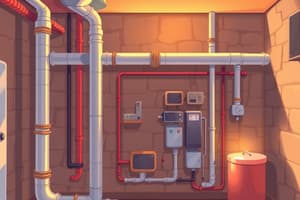Podcast
Questions and Answers
What is the main difference between boilers and furnaces in HVAC systems?
What is the main difference between boilers and furnaces in HVAC systems?
- Boilers are more energy efficient than furnaces.
- Boilers are only used in residential applications, while furnaces are used in commercial applications.
- Boilers are more reliable than furnaces.
- Boilers use water or steam to distribute heat, while furnaces use air. (correct)
Why is regular air filter replacement crucial for heating systems?
Why is regular air filter replacement crucial for heating systems?
- To encourage mold and mildew growth.
- To increase energy consumption and potential damage to the unit.
- To restrict airflow and force the system to work harder.
- To maintain proper airflow and prevent dust and debris accumulation. (correct)
Why are efficient HVAC heating systems important?
Why are efficient HVAC heating systems important?
- To create an uncomfortable indoor environment.
- To reduce environmental impact and lower utility costs. (correct)
- To increase humidity and encourage mold growth.
- To minimize energy efficiency and increase heating expenses.
What is the role of a well-functioning heating system in indoor environments?
What is the role of a well-functioning heating system in indoor environments?
What is the purpose of periodic inspections by qualified HVAC professionals for heating systems?
What is the purpose of periodic inspections by qualified HVAC professionals for heating systems?
What is the primary function of HVAC heating systems?
What is the primary function of HVAC heating systems?
How do furnaces in HVAC systems produce heat?
How do furnaces in HVAC systems produce heat?
What makes heat pumps versatile in HVAC systems?
What makes heat pumps versatile in HVAC systems?
What is the primary advantage of furnaces in HVAC systems?
What is the primary advantage of furnaces in HVAC systems?
Why are heat pumps considered energy-efficient in HVAC systems?
Why are heat pumps considered energy-efficient in HVAC systems?
Flashcards are hidden until you start studying
Study Notes
All About HVAC Heating Systems
Heating, ventilation, and air conditioning (HVAC) systems are essential for maintaining a comfortable indoor environment, especially during extreme weather conditions. In this article, we will delve into the world of HVAC heating systems, exploring the different types, their functions, and the importance of regular maintenance.
The Basics of HVAC Heating Systems
Heating systems are integral components of HVAC setups, designed to regulate indoor temperature by generating warmth during cold weather. These systems come in various forms, each with its own unique features and benefits.
Furnaces
Furnaces are one of the most common heating systems in HVAC setups. They work by burning fuel, such as natural gas, oil, or propane, to produce heat. This heat is then distributed throughout the building via ductwork and vents. Furnaces are known for their efficiency and ability to quickly warm up indoor spaces, making them a popular choice for many homes and commercial buildings.
Heat Pumps
Heat pumps are versatile heating systems that can also function as air conditioners. During the colder months, heat pumps extract heat from the outdoor air and transfer it indoors. They operate on the principle of heat transfer, making them energy-efficient and environmentally friendly. Heat pumps are especially popular in moderate climates where extreme cold is less of a concern.
Boilers
Boilers are another type of heating system commonly found in HVAC setups. Unlike furnaces, which use air to distribute heat, boilers utilize water or steam. The heated water or steam is then circulated through radiators, baseboard heaters, or underfloor tubing to warm the surrounding space. Boilers are known for their reliability and even heat distribution, making them a preferred choice for many residential and commercial applications.
The Importance of Efficient Heating Systems
Efficient heating systems play a crucial role in ensuring comfort and well-being, particularly in regions with harsh winters. Here are some key reasons why having an efficient HVAC heating system is essential:
Energy Efficiency
Modern HVAC heating systems are designed to operate with high energy efficiency, helping to reduce overall energy consumption and lower utility costs. By investing in an efficient heating system, homeowners and businesses can minimize their environmental impact while enjoying substantial savings on heating expenses.
Comfort and Productivity
A well-functioning heating system contributes to a comfortable indoor environment, promoting better concentration, productivity, and overall well-being. Whether at home or in the workplace, maintaining a consistent and comfortable temperature is vital for creating a conducive atmosphere for daily activities.
Health and Safety
During colder months, a reliable heating system is essential for safeguarding health and safety. Proper heating helps prevent issues such as hypothermia and cold-related illnesses, particularly among vulnerable populations such as children and the elderly. Additionally, efficient heating systems contribute to indoor air quality by reducing humidity and minimizing the risk of mold and mildew growth.
Maintenance and Care for Heating Systems
To ensure the optimal performance and longevity of HVAC heating systems, regular maintenance and care are imperative. Here are some essential maintenance tasks that can help keep heating systems in top shape:
Filter Replacement
Regularly replacing the air filters in heating systems is crucial for maintaining proper airflow and preventing dust and debris from accumulating. Clogged filters can restrict airflow and force the system to work harder, leading to increased energy consumption and potential damage to the unit.
System Inspections
Periodic inspections by qualified HVAC professionals are essential for identifying any potential issues or inefficiencies within the heating system. These inspections can help detect and address problems early on, preventing costly repairs and ensuring the system operates at peak performance.
Cleaning and Lubrication
Cleaning the heating system components and ensuring proper lubrication of moving parts can significantly impact its efficiency and longevity. Dust and debris accumulation can hinder performance, while inadequate lubrication can cause excessive wear and tear on crucial components.
Thermostat Calibration
Calibrating the thermostat ensures that the heating system accurately responds to temperature settings, preventing energy waste and promoting consistent comfort levels. Proper thermostat calibration is essential for optimizing energy usage and maintaining a comfortable indoor environment.
In conclusion, HVAC heating systems are vital for maintaining a comfortable and healthy indoor environment, especially during cold weather. Whether through furnaces, heat pumps, or boilers, these systems play a crucial role in regulating indoor temperature and promoting energy efficiency. By investing in efficient heating systems and prioritizing regular maintenance, homeowners and businesses can ensure long-term comfort, cost savings, and environmental responsibility.
Studying That Suits You
Use AI to generate personalized quizzes and flashcards to suit your learning preferences.




